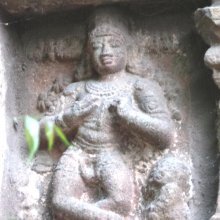Apaviddha: 16 definitions
Introduction:
Apaviddha means something in Hinduism, Sanskrit, Buddhism, Pali, Jainism, Prakrit. If you want to know the exact meaning, history, etymology or English translation of this term then check out the descriptions on this page. Add your comment or reference to a book if you want to contribute to this summary article.
Images (photo gallery)
In Hinduism
Natyashastra (theatrics and dramaturgy)
Source: Wisdom Library: Nāṭya-śāstra1) Apaviddha (अपविद्ध).—One of the 108 karaṇas (minor dance movement) mentioned in the Nāṭyaśāstra chapter 4. The instructions for this apaviddha-karaṇa is as follows, “The [tight] hand with Śukatuṇḍa gesture to fall on the [right] thigh, the left hand held on the chest.”.
2) Apaviddha (अपविद्ध).—One of the 32 aṅgahāras (major dance movement) mentioned in the Nāṭyaśāstra chapter 4. The instructions for this apaviddha-aṅgahāra is as follows, “Apaviddha and Sūcīviddha Karaṇas, then observing Udveṣṭita-karaṇa with hands and turning the Trika, showing with hands Uromaṇḍalaka gestures and assuming Kaṭicchinna Karaṇa.”.
A karaṇa represents a minor dance movements and combines sthāna (standing position), cārī (foot and leg movement) and nṛttahasta (hands in dancing position). A sequence of multiple karaṇas combine into an aṅgahara (major dance movement).
3) Apaviddha (अपविद्ध) refers to a specific gesture (āṅgika) , or “movements made with the arms (bāhu)”, according to the Nāṭyaśāstra chapter 9. These movements form a part of the histrionic representation (abhinaya).
Source: Shodhganga: Elements of Art and Architecture in the Trtiyakhanda of the Visnudharmottarapurana (natya)Apaviddha (अपविद्ध) refers to one of the 108 kinds of Karaṇa (“coordination of precise movements of legs and hands”), according to the Viṣṇudharmottarapurāṇa, an ancient Sanskrit text which (being encyclopedic in nature) deals with a variety of cultural topics such as arts, architecture, music, grammar and astronomy.—According to the Viṣṇudharmottarapurāṇa, karaṇas are the coordination of precise movements of legs and hands performed in a particular posture. The Nāṭyaśāstra also gives its view point in the same spirit. In the Viṣṇudharmottarapurāṇa, one hundred and eight kinds of karaṇas are accepted, e.g., Apaviddha.

Natyashastra (नाट्यशास्त्र, nāṭyaśāstra) refers to both the ancient Indian tradition (shastra) of performing arts, (natya—theatrics, drama, dance, music), as well as the name of a Sanskrit work dealing with these subjects. It also teaches the rules for composing Dramatic plays (nataka), construction and performance of Theater, and Poetic works (kavya).
Dharmashastra (religious law)
Source: Shodhganga: The Vyavaharadhyaya of the YajnavalkyasmritiApaviddha (अपविद्ध) refers to one of the twelve types of sons (putra) defined in the Vyavahārādhyāya of the Yājñavalkyasmṛti verse 2.128-132.—The son who is taken or adopted by a person, after having been deserted by his parents, is called Apaviddha or deserted son.

Dharmashastra (धर्मशास्त्र, dharmaśāstra) contains the instructions (shastra) regarding religious conduct of livelihood (dharma), ceremonies, jurisprudence (study of law) and more. It is categorized as smriti, an important and authoritative selection of books dealing with the Hindu lifestyle.
Languages of India and abroad
Pali-English dictionary
Source: BuddhaSasana: Concise Pali-English Dictionaryapaviddha : (pp. of apavijjhati) thrown away; rejected.
Source: Sutta: The Pali Text Society's Pali-English DictionaryApaviddha, (pp. of apavijjhati, Vedic apa + vyadh) thrown away, rejected, discarded, removed S.I, 202; III, 143; Sn.200 (susānasmiṃ = chaḍḍita SnA 250); Th.1, 635 = Dh.292 (= chaḍḍita DhA.III, 452); Pv III, 82 (susānasmiṃ; so read for T. apaviṭṭha); J.I, 255; III, 426; YI.90 (= chaḍḍita C.). Sdhp.366. (Page 53)

Pali is the language of the Tipiṭaka, which is the sacred canon of Theravāda Buddhism and contains much of the Buddha’s speech. Closeley related to Sanskrit, both languages are used interchangeably between religions.
Sanskrit dictionary
Source: DDSA: The practical Sanskrit-English dictionaryApaviddha (अपविद्ध).—&c. See under अपव्यध् (apavyadh).
--- OR ---
Apaviddha (अपविद्ध).—p. p.
1) Cast or thrown off, thrown or cast away, abandoned, forsaken; तेनाहमपविद्धश्च हृतदारश्च राघव (tenāhamapaviddhaśca hṛtadāraśca rāghava) Rām.4.1.27. dismissed, rejected, neglected, removed; oft. used in the sense of 'freed from', 'devoid of'; रक्षो- विप्रकृतावास्तामपविद्धशुचाविव (rakṣo- viprakṛtāvāstāmapaviddhaśucāviva) R.1.74.
2) Abject, mean. शव इवापविद्धः (śava ivāpaviddhaḥ) Bhāgavata 5.14.2.
-ddhaḥ, °पुत्रः (putraḥ) A son that is abandoned by the father or mother or by both, and adopted by a stranger; one of the 12 kinds of sons among Hindus; मातापितृभ्यामुत्सृष्टं तयोरन्यतरेण वा । यं पुत्रं परि- गृह्णीयादपविद्धः स उच्यते (mātāpitṛbhyāmutsṛṣṭaṃ tayoranyatareṇa vā | yaṃ putraṃ pari- gṛhṇīyādapaviddhaḥ sa ucyate) || Manusmṛti 9.171; उत्सृष्टो गृह्यते यस्तु सोऽप- विद्धो भवेत्सुतः (utsṛṣṭo gṛhyate yastu so'pa- viddho bhavetsutaḥ) Y.2.132.
Source: Cologne Digital Sanskrit Dictionaries: Shabda-Sagara Sanskrit-English DictionaryApaviddha (अपविद्ध).—mfn.
(-ddhaḥ-ddhā-ddhaṃ) 1. Rejected, dismissed, removed. 2. Thrown, sent. 3. Broken to pieces. E. apa before. vyadha to strike, kta the part. affix, and the semivowel changed to its corresponding vowel i.
Source: Cologne Digital Sanskrit Dictionaries: Cappeller Sanskrit-English DictionaryApaviddha (अपविद्ध).—[adjective] pierced, hit; thrown away, rejected, removed, given up, neglected.
Source: Cologne Digital Sanskrit Dictionaries: Monier-Williams Sanskrit-English Dictionary1) Apaviddha (अपविद्ध):—[=apa-viddha] a See apa-√vyadh.
2) [=apa-viddha] [from apa-vyadh] b mfn. pierced
3) [v.s. ...] thrown away, rejected, dismissed, removed.
Source: Cologne Digital Sanskrit Dictionaries: Goldstücker Sanskrit-English DictionaryApaviddha (अपविद्ध):—[tatpurusha compound] m. f. n.
(-ddhaḥ-ddhā-ddham) 1) Rejected, discarded, disowned; apaviddhaḥ putraḥ is, in law, a son who having been disowned by his natural parents or, in the case of the death of either of them, having been disowned by the surviving parent, is adopted by another; one of the twelve kinds of adopted sons, comp. s. v. anyavījaja; also said of a girl, e. g. in the Bhāgav. Pur. kaṇḍoḥ pramlocayā labdhā kanyā kamalalocanā . tāṃ cāpaviddhāṃ jagṛhurbhūruhā nṛpanandanāḥ (comm. apaviddhāṃ tyaktām).
2) Abject, contemptible, e. g. (Rudra speaks to Viṣṇu in the Bhāgav. Pur.) yadi racitadhiyaṃ māvidyaloko paviddhaṃ japati na gaṇaye tattvatparānugraheṇa (comm. apaviddhamācārabhraṣṭam), ‘if the ignorant world declares me whose mind is properly framed, to be abject, I do not mind it on account of thy paramount grace’; Burnouf renders this passage: ‘si pendant ce temps le monde ignorant m'appelle avec mépris contempteur des lois &c.’.
3) Disabled, broken (lit. or fig.), e. g. gargāṇāṃ vāhanamapaviddham; (Kaiyyaṭa: apaviddhamiti vahanaśaktivikalaṃ pranaṣṭamityarthaḥ); or in the Mālatīm. hṛdayamaśaraṇaṃ me pakṣmalākṣyāḥ kaṭākṣairapahṛtamapaviddhaṃ pītamunmūlitaṃ ca.
4) Neglected; (in this sense also in the Buddh. Dhammapada ed. Fausböll v. 292). E. vyadh, with apa, kṛt aff. kta and samprasāraṇa of the radical.
Source: Cologne Digital Sanskrit Dictionaries: Yates Sanskrit-English Dictionary1) Apaviddha (अपविद्ध):—[apa-viddha] (ddhaḥ-ddhā-ddhaṃ) a. Rejected.
2) [apa-viddha] (ddhaḥ-ddhā-ddhaṃ) p. Pierced.
Source: DDSA: Paia-sadda-mahannavo; a comprehensive Prakrit Hindi dictionary (S)Apaviddha (अपविद्ध) in the Sanskrit language is related to the Prakrit words: Apaviddha, Oviddha.
[Sanskrit to German]
Sanskrit, also spelled संस्कृतम् (saṃskṛtam), is an ancient language of India commonly seen as the grandmother of the Indo-European language family (even English!). Closely allied with Prakrit and Pali, Sanskrit is more exhaustive in both grammar and terms and has the most extensive collection of literature in the world, greatly surpassing its sister-languages Greek and Latin.
Prakrit-English dictionary
Source: DDSA: Paia-sadda-mahannavo; a comprehensive Prakrit Hindi dictionaryApaviddha (अपविद्ध) in the Prakrit language is related to the Sanskrit word: Apaviddha.
Prakrit is an ancient language closely associated with both Pali and Sanskrit. Jain literature is often composed in this language or sub-dialects, such as the Agamas and their commentaries which are written in Ardhamagadhi and Maharashtri Prakrit. The earliest extant texts can be dated to as early as the 4th century BCE although core portions might be older.
Kannada-English dictionary
Source: Alar: Kannada-English corpusApaviddha (ಅಪವಿದ್ಧ):—
1) [adjective] refuted; denied.
2) [adjective] abandoned; forsaken; deserted.
3) [adjective] (said of a whole, an aperture) not properly made.
--- OR ---
Apaviddha (ಅಪವಿದ್ಧ):—[noun] (dance) a particular stance.
Kannada is a Dravidian language (as opposed to the Indo-European language family) mainly spoken in the southwestern region of India.
See also (Relevant definitions)
Starts with: Apaviddhaloka, Apaviddhaputra.
Ends with: Apapaviddha, Vyapaviddha.
Full-text (+2): Apaviddhaloka, Apaviddhaputra, Vyapaviddhabrishimatha, Vyapaviddha, Oviddha, Apavittha, Savyadh, Bahu, Cakramandala, Katibhranta, Uromandala, Angahara, Paryastaka, Mattaskhalitaka, Apavyadh, Anyavijaja, Matalli, Akshiptarecita, Valita, Vishkambha.
Relevant text
Search found 14 books and stories containing Apaviddha, Apa-viddha; (plurals include: Apaviddhas, viddhas). You can also click to the full overview containing English textual excerpts. Below are direct links for the most relevant articles:
Gati in Theory and Practice (by Dr. Sujatha Mohan)
Representation of Gati with Karaṇas and Aṅgahāras < [Chapter 2 - Concept and technique of Gati]
Gaits pertaining to conditions < [Chapter 2 - Concept and technique of Gati]
Elucidation of Karaṇas related to Gati < [Chapter 2 - Concept and technique of Gati]
The Skanda Purana (by G. V. Tagare)
Chapter 223 - Kinds of Sons Eligible to Offer Śrāddha < [Section 1 - Tīrtha-māhātmya]
Chapter 241 - Characteristics of a Good Śūdra < [Section 1 - Tīrtha-māhātmya]
Dhammapada (Illustrated) (by Ven. Weagoda Sarada Maha Thero)
Verse 292-293 - The Story of the Venerables of Bhaddiya < [Chapter 21 - Pakiṇṇaka Vagga (Miscellaneous)]
Manusmriti with the Commentary of Medhatithi (by Ganganatha Jha)
Verse 9.171 < [Section XXIII - The Twelve Kinds of Sons defined]
Verse 9.159-160 < [Section XXII - The Relative Status of the Twelve Kinds of Sons]
Yajnavalkya-smriti (Vyavaharadhyaya)—Critical study (by Kalita Nabanita)
Chapter 3.4 - Different kinds of Sons < [Chapter 3 - The Social Aspect Depicted in the Vyavahārādhyāya]
Chapter 5.6 - Laws Relating to Partition and Inheritance (dāyavibhāga) < [Chapter 5 - Vyavahārādhyāya and the Modern Indian Laws]
Natyashastra (English) (by Bharata-muni)



